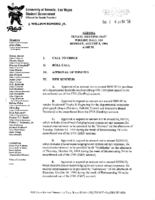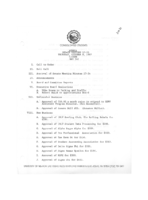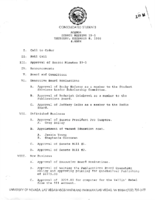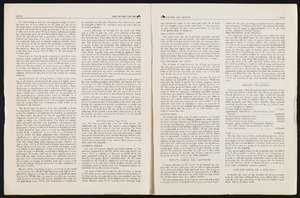Search the Special Collections and Archives Portal
Search Results
J. David Hoggard oral history interview
Identifier
Abstract
Oral history interview with J. David Hoggard conducted by Claytee White and unnamed interviewer on various dates in 1997, 1998, and 1999 for the Women's Research Institute of Nevada (WRIN). Hoggard discusses serving in World War II, being transferred to Nellis Air Force Base in 1945, and moving to Las Vegas, Nevada from New Jersey in 1946. He also recalls becoming one of the first African American police officers in Las Vegas, and working in the Clark County School District for 15 years. Hoggard then discusses his involvement with the National Association for the Advancement of Colored People (NAACP), including serving as chapter president for four years.
Archival Collection
Senator Chic Hecht Political Papers
Identifier
Abstract
The Senator Chic Hecht Political Papers (1943-1988) contain the political papers of United States Senator and Las Vegas, Nevada businessman Chic Hecht. The bulk of the collection contains legislation, notes, correspondence between Hecht and constituents and other members of Congress, and speeches from Senator Hecht's term in the Senate from 1982 to 1988. Also included are files on civil service, the federal budget, education, labor, transportation, land management, foreign policy, public health, and trade.
Archival Collection
Aplin Family Scrapbooks
Identifier
Abstract
The Aplin Family Scrapbooks (1927-1971) consists of four handmade scrapbooks compiled by Hilda Aplin. The scrapbooks contain photographs, correspondence, newspaper clippings, and handwritten captions. The majority of the collection focuses on Hilda and Charles Aplin’s involvement in the Fraternal Order of Eagles and Las Vegas Eagles Auxiliary #1213. Also included is a photograph album that details the family’s activities from 1927 to 1959, including notable locations around Las Vegas, Nevada such as Lake Mead, Hoover Dam, Mt. Charleston, and annual Helldorado parades.
Archival Collection

Meeting minutes for Consolidated Student Senate University of Nevada, Las Vegas, August 08, 1994
Date
Archival Collection
Description
Text

Meeting minutes for Consolidated Student Senate University of Nevada, Las Vegas, October 8, 1987
Date
Archival Collection
Description
Text

Meeting minutes for Consolidated Student Senate University of Nevada, Las Vegas, April 3, 1986
Date
Archival Collection
Description
Text

Meeting minutes for Consolidated Student Senate University of Nevada, Las Vegas, December 8, 1988
Date
Archival Collection
Description
Text

Meeting minutes for Consolidated Student Senate, University of Nevada, Las Vegas, April 19, 1983
Date
Archival Collection
Description
Text
The Story of Classic Las Vegas Oral History Interviews
Identifier
Abstract
Archival Collection

